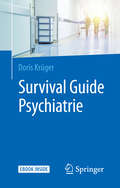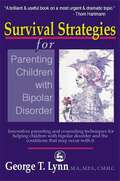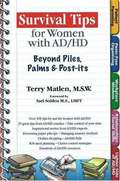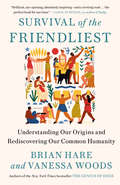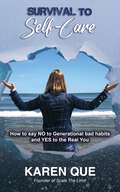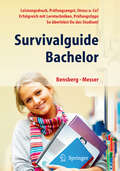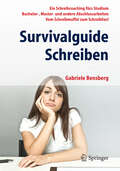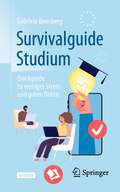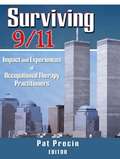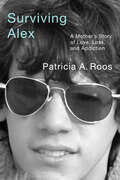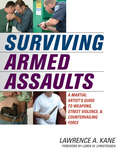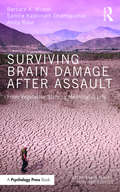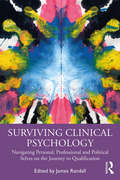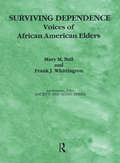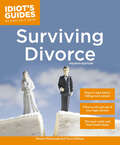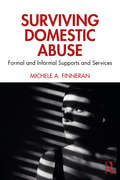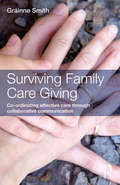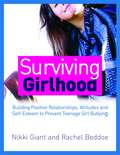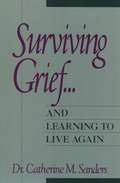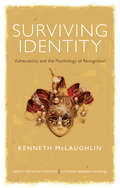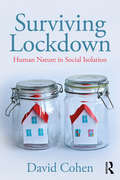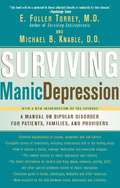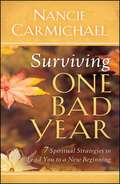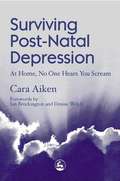- Table View
- List View
Survival Guide Psychiatrie
by Doris KrügerDas Buch führt praxisorientiert und konsequent den Assistenzart durch die Hindernisse im ersten Jahr der Psychiatrie. Es beantwortet zahlreiche organisatorische Fragen und ist der Rote Faden, der Anfängern zu Beginn ihrer Berufszeit die Unsicherheit nehmen soll.
Survival Strategies for Parenting Children with Bipolar Disorder: Innovative Parenting and Counseling Techniques for Helping Children with Bipolar Disorder and the Conditions That May Occur With It
by George Lynn'A definitve guide covering all aspects of Bipolar in children, from spotting the symptoms to getting the correct interventions to help cope with the condition. This book explains the Biological causes and helps to seperate the symptoms from those of other conditions including, Tourettes, Aspergers and ADHD, whilst acknowledging that the conditions can appear as co-morbid in some children. Full of practical help and support George Lynn discusses various case histories and how to cope as a parent, along with a guide to help the child learn strategies to live with Bipolar.' - adders.org 'The author, George Lynn, is a certified medical health counselor who has pioneered the usage of psychotherapy for adults and children with neuropsychological issues. When his own son was diagnosed with Tourette syndrome in 1991, he realized that personality can be powerfully impacted by brain chemistry independent of environment...The book is orientated for parents, but I believe many professionals can find helpful tips and information.' - International Journal of Adolescent Medical Health 'George T. Lynn's book, Survival Strategies for Parenting Children with Bipolar Disorder is a valuable resource for parents and those in the mental health profession. The author draws on his experience as a counselor to describe the symptoms of Bipolar Disorder and Bipolar Disorder co-existing with Asperger's Syndrome, Tourette's Disorder or ADHD. He provides a clear, comprehensive perspective on effectively parenting a child with bipolar disorder. He also explains what characteristics the disorders have in common and how they differ from each other. Lynn is skilled at developing the differential diagnosis of disorders that often have significant overlapping characteristics. In every chapter Lynn provides a comprehensive case history, parent survival strategies and simple, straightforward tips for 'surviving meltdowns.' He includes a section on brain physiology, medication management and school success. He gives practical advice about difficult decisions that parents often have to make, including when to call the police and the pros and cons of psychiatric hospitalization. With this book, George Lynn has made a major contribution in the area of parenting children with Bipolar Disorder. He successfully instructs the reader on how to understand and identify the symptoms of these disorders and at the same time how to focus on the child's strengths or "gifts". He delivers a well written and interesting book that provides realistic solutions to difficult problems, and hope to families of these exceptional children.' - Metapsychology Online Review Up until five years ago, the professional community did not think that Bipolar Disorder occurred in children. Children with symptoms of Bipolar Disorder were diagnosed as 'severe ADHD', 'depressed' or 'Oppositional Defiant'. Now, as it is being increasingly diagnosed, George Lynn offers clear, practical advice on recognizing the symptoms, understanding medication and accessing the necessary support at school as well as the managing the day-to-day challenges of parenting a child with Bipolar Disorder. As it is frequently found in combination with ADHD, Tourette Syndrome and Asperger's Syndrome, the author draws on case-studies from his own psychotherapeutic practice to show what these conditions have in common, how they differ, and how they relate to each other. Survival Strategies for Parenting Children with Bipolar Disorder, tackles the most difficult decisions parents can face, including whether to involve police or consider hospitalization if their children are a danger to themselves and their families. At the same time, it emphasizes the positive qualities these children often have and illustrates how their gifts and abilities can build their self-esteem and help them function better in society. However severe the child's symptoms, George Lynn's book will provide guidance, support and inspiration for parents and carers as well as being a useful resource for professionals working with the families who ...
Survival Tips For Women With AD/HD: Beyond Piles, Palms And Post-its
by Terry MatlenWomen with AD/HD tormented by the daily chores and decisions needed to survive in a world of linear thinking will find solace in this self-help guide. Practical tips provide help in dealing with organizational tasks, including paperwork in the home and office, preparing meals, social situations, paying bills on time, household chores, shopping, and personal and family health.
Survival of the Friendliest: Understanding Our Origins and Rediscovering Our Common Humanity
by Brian Hare Vanessa WoodsA powerful new theory of human nature suggests that our secret to success as a species is our unique friendliness&“Brilliant, eye-opening, and absolutely inspiring—and a riveting read. Hare and Woods have written the perfect book for our time.&”—Cass R. Sunstein, author of How Change Happens and co-author of Nudge For most of the approximately 300,000 years that Homo sapiens have existed, we have shared the planet with at least four other types of humans. All of these were smart, strong, and inventive. But around 50,000 years ago, Homo sapiens made a cognitive leap that gave us an edge over other species. What happened? Since Charles Darwin wrote about &“evolutionary fitness,&” the idea of fitness has been confused with physical strength, tactical brilliance, and aggression. In fact, what made us evolutionarily fit was a remarkable kind of friendliness, a virtuosic ability to coordinate and communicate with others that allowed us to achieve all the cultural and technical marvels in human history. Advancing what they call the &“self-domestication theory,&” Brian Hare, professor in the department of evolutionary anthropology and the Center for Cognitive Neuroscience at Duke University and his wife, Vanessa Woods, a research scientist and award-winning journalist, shed light on the mysterious leap in human cognition that allowed Homo sapiens to thrive. But this gift for friendliness came at a cost. Just as a mother bear is most dangerous around her cubs, we are at our most dangerous when someone we love is threatened by an &“outsider.&” The threatening outsider is demoted to sub-human, fair game for our worst instincts. Hare&’s groundbreaking research, developed in close coordination with Richard Wrangham and Michael Tomasello, giants in the field of cognitive evolution, reveals that the same traits that make us the most tolerant species on the planet also make us the cruelest. Survival of the Friendliest offers us a new way to look at our cultural as well as cognitive evolution and sends a clear message: In order to survive and even to flourish, we need to expand our definition of who belongs.
Survival to Self-Care - How to say NO to generational bad habits and YES to the real you
by Karen QueSurvival to Self-Care: How to say NO to generational bad habits and YES to the real you is a story based self-help book which brings to light generational cycles and presents a seven-step process to stop passing them on to future generations. Karen Que explores how life has a way of piling on unfulfilled expectations. These help to build up varying levels of emotional armor, requiring new skills for survival. At the height of her career, feeling buried in pain at her lowest moment, she dug her way out by discovering how to identify, unpack, and release cycles which were handed down through the generations. Each purchase of Survival to Self-Care comes with a special BONUS Companion E-Journal featuring 20 pages to help you accelerate your transformation with exercises and additional tools for better self-care.
Survivalguide Bachelor. Leistungsdruck, Prüfungsangst, Stress und Co? Erfolgreich mit Lerntechniken, Prüfungstipps ... so überlebst Du das Studium
by Gabriele Bensberg Jürgen MesserDurch das Bachelor-Studium hat sich das Studieren verändert. Häufige Prüfungen und überfrachtete Studienpläne setzen Studierende unter Druck, die Prüfungsangst nimmt zu. Die Autoren leiten eine Beratungsstelle des Studentenwerks, sie kennen diese Nöte. In ihrem Ratgeber zeigen sie auf einfühlsame und humorvolle Weise, wie sich Studierende physisch und psychisch stärken können: durch Bewegung, Entspannungstechniken und Genuss. Sie vermitteln Strategien für effektives Lernen, für das Stressmanagement sowie Hilfen zur Bewältigung der Prüfungsangst.
Survivalguide Schreiben: Ein Schreibcoaching fürs Studium Bachelor-, Master- und andere Abschlussarbeiten Vom Schreibmuffel zum Schreibfan!
by Gabriele BensbergWenn Studierenden das Schreiben wissenschaftlicher Texte schwer fällt, kann es für sie zum Fluch werden - bis hin zur Angst, an der Abschlussarbeit zu scheitern. Die Autorin, erfahrene Studierenden-Beraterin und Schreibcoach, zeigt in diesem Buch, wie Studierende aufbauend auf ihren alltäglichen Schreibaktivitäten im Internet eine Brücke zum wissenschaftlichen Schreiben schlagen können. Das Buch bietet Handlungsanleitungen und Problemlösungen für alle Phasen der wissenschaftlichen Arbeit und dient darüber hinaus als psychologischer Begleiter.
Survivalguide Studium: Quickguide zu weniger Stress und guten Noten
by Gabriele BensbergStudieren hat es in sich heutzutage - nicht erst seit Beginn der Corona-Pandemie! Doch hier kommt ein kleines Buch, das Dir auf wenigen Seiten den Weg durch den Studi-Alltagsdschungel zeigt. Es gibt viele handliche Tipps rund um Themen wie Arbeitsplatz, Zeitmanagement, Lernmethoden, Möglichkeiten, die Gedächtnisleistung zu steigern sowie die Vorbereitung von Prüfungen und das Schreiben wissenschaftlicher Arbeiten. - Du leidest unter Prüfungsangst oder Schreibblockaden? Lass Dich nicht entmutigen - denn auch das ist lösbar, dieser Ratgeber sagt Dir, wie! Und nicht zuletzt hat er noch hilfreiche Tipps parat, wie Du ganz allgemein eine individuelle Lebensvision entwickelst, Dir Ziele setzt und Selbstvertrauen gewinnst, um Deinen eigenen Weg zu finden und diesen auch bei Widerständen zu gehen - denn wer sich über all dies im Klaren ist, den werfen die Probleme des Studienalltags auch nicht so schnell aus der Bahn. Kurz: Dies ist Dein Guide für den tollen Lebensabschnitt, der sich Studium nennt!
Surviving 9/11: Impact and Experiences of Occupational Therapy Practitioners
by Pat PrecinThe first in-depth look of the effects of September 11 on occupational therapy! Surviving 9/11: Impact and Experiences of Occupational Therapy Practitioners is a collection of firsthand accounts from occupational therapy providers and their clients. This book reveals the thoughts and fears of occupational therapists who had to help heal their patients while suffering emotional and psychological stress themselves. This volume shows how occupational therapy practitioners dealt with the aftermath using group discussions, planned events, and creative projects to heal themselves as well as their clients. Surviving 9/11 demonstrates the importance of therapeutic treatment for all types of victims of the attacks, from survivors to television observers. It discusses how distinct each client&’s needs are-from the survivor in the hospital bed to the firefighter endlessly searching for his lost brothers. This book will also show you the importance of changing therapeutic styles during the lengthy coping process to adapt to the changing needs of the client. This enlightening text is divided into three parts: September 11th Day One-personal and professional accounts of the day of the disaster from occupational therapists in and around the city and around the world-with a special narrative from a 9/11 survivor who received occupational therapy Ground Zero Milieu-the experiences in and around Ground Zero following the attack, including occupational therapists at the rescue and recovery site, the Federal Emergency Management Agency&’s (FEMA) Project Liberty program, and the development of the Downtown Therapists Assistance Project to help occupational and physical therapists whose businesses were irrecoverable after September 11 Spirituality-the new challenges to occupational therapy in mental health in dealing with post-traumatic stress disorder and panic disorder-throughout the general population and in the mental health community Surviving 9/11 is a unique blend of personal and professional perspectives designed to help you get in touch with your feelings and thoughts about what happened on September 11. More importantly, this easy-to-read book can help you prepare for future disasters, whether you are a healthcare professional, a disabled person, a survivor, or someone who is otherwise affected. With illustrations, memorial designs, and photos of the tragedy and its aftermath, this book is a must-read in this age of uncertainty.
Surviving Alex: A Mother’s Story of Love, Loss, and Addiction
by Patricia A. RoosIn 2015, Patricia Roos’s twenty-five-year-old son Alex died of a heroin overdose. Turning her grief into action, Roos, a professor of sociology at Rutgers University, began to research the social factors and institutional failures that contributed to his death. Surviving Alex tells her moving story—and outlines the possibilities of a more compassionate and effective approach to addiction treatment. Weaving together a personal narrative and a sociological perspective, Surviving Alex movingly describes how even children from “good families” fall prey to addiction, and recounts the hellish toll it takes on families. Drawing from interviews with Alex’s friends, family members, therapists, teachers, and police officers—as well as files from his stays in hospitals, rehab facilities, and jails—Roos paints a compelling portrait of a young man whose life veered between happiness, anxiety, success, and despair. And as she explores how a punitive system failed her son, she calls for a community of action that would improve care for substance users and reduce addiction, realigning public health policy to address the overdose crisis.
Surviving Armed Assaults: A Martial Artists Guide to Weapons, Street Violence, and Countervailing Force
by Lawrence A. KaneFair Fight? Not likely. Least of all from a criminal who is looking to make a quick profit at your expense. A sad fact is that weapon-wielding thugs victimize 1,773,000 citizens every year in the United States alone. Even martial artists are not immune from this deadly threat. Consequently, self-defense training that does not consider the very real possibility of an armed attack is dangerously incomplete. Whether you live in the city or countryside, you should be both mentally and physically prepared to deal with an unprovoked armed assault at any time. Preparation must be comprehensive enough to account for the plethora of pointy objects, blunt instruments, explosive devices, and deadly projectiles that someday could be used against you. This extensive book teaches proven survival skills that can keep you safe on the street. A multitude of real-life scenarios and case studies analyzing violent encounters will help you to internalize this crucial knowledge. Contents include: * Awareness * Avoidance * De-escalation * Countervailing force * Armed conflict * Managing the aftermath of violence * Weapon features and functions If you are serious about self-defense this book is for you. Everyone, including experienced martial artists, security and law enforcement professionals, and concerned citizens will benefit from this vital information.
Surviving Brain Damage After Assault: From Vegetative State to Meaningful Life (After Brain Injury: Survivor Stories)
by Barbara A. Wilson Samira Kashinath Dhamapurkar Anita RoseAt the age of twenty eight Gary was assaulted by a gang with baseball bats and a hammer, resulting in several skull fractures and severe brain damage. For nineteen months he had little awareness of his surroundings before he started to show some recovery. This inspirational book documents his exceptional journey. The book presents a series of interviews with Gary, his mother Wendie, who never gave up, the medical team who initially treated him, and the therapists who worked with him over a period of three years. Through their testimony we learn about the devastating effects which can follow a serious assault to the head, and the long process of recovery over several years. With specialist rehabilitation and continuing family support Gary has exceeded expectations and, apart from some minor physical problems, he is now a normal young man. Surviving Brain Damage after Assault shows that, contrary to popular belief, considerable gains can be made by people who have experienced a long period of reduced consciousness. The book will be of great value to all professionals working in rehabilitation - psychologists, speech and language therapists, occupational therapists, social workers and rehabilitation doctors, and to people who have sustained a brain injury and their families.
Surviving Clinical Psychology: Navigating Personal, Professional and Political Selves on the Journey to Qualification
by James RandallThis vital new book navigates the personal, professional and political selves on the journey to training in clinical psychology. Readers will be able to explore a range of ways to enrich their practice through a focus on identities and differences, relationships and power within organisations, supervisory contexts, therapeutic conventions and community approaches. This book includes a rich exploration of how we make sense of personal experiences as practitioners, including chapters on self-formulation, personal therapy, and using services. Through critical discussion, practice examples, shared accounts and exercises, individuals are invited to reflect on a range of topical issues in clinical psychology. Voices often marginalised within the profession write side-by-side with those more established in the field, offering a unique perspective on the issues faced in navigating clinical training and the profession more broadly. In coming together, the authors of this book explore what clinical psychology can become. Surviving Clinical Psychology invites those early on in their careers to link ‘the political’ to personal and professional development in a way that is creative, critical and values-based, and will be of interest to pre-qualified psychologists and researchers, and those mentoring early-career practitioners.
Surviving Dependence: Voices of African American Elders (Society and Aging Series)
by Mary M Ball Frank J WhittingtonTo date there has not been a clear look at the home care experience of older African Americans. "Surviving Dependence: Voices of African American Elders" attempts to meet the need for recording and interpreting the ordinary life of elderly African Americans on their own terms, in their own surroundings, and in so far as possible, in their own words. Ball and Whittington's research is unique in two ways: it focuses on older people who are African American and poor, and it describes the viewpoint of care recipients and their relationships with the public programs designed to help them. This book provides an in-depth view of the experiences of these seven frail elders as both care receivers and as active participants in their own care. The two primary themes the significant disabilities that often accompany old age and the tenacious will and ability to cope possessed by our informants are reflected in the title: "Surviving Dependence."
Surviving Divorce, Fourth Edition (Idiot's Guides)
by Pamela Weintraub Terry HillmanDivorce is a complicated, if not messy, process that requires expert information. Beginning with cautionary advice and enabling the reader to be sure divorce is the right answer, the founders of Divorce Central, an online service for the divorced and divorcing, provide all of the answers. This new edition moves right into the 21 strategic steps to planning for divorce and covers everything from finding the best ways to expedite the process, avoid unneeded expenses, handle custody and visitation, deal with emotions, and help children through the conflict.
Surviving Domestic Abuse: Formal and Informal Supports and Services
by Michele A. FinneranSurviving Domestic Abuse examines how formal and informal supports and services can mitigate the damaging, and sometimes fatal, social cost of domestic violence. The book highlights victims’ perceptions of supports and lays a foundation for professionals and family members to effectively assist victims of domestic abuse. The book offers actionable recommendations and multiple-use cases to fill gaps in the understanding of the complexities that exist in domestic violence dynamics. Dr Finneran uses real-life interviews with victims to inform action and intervention for policy, strategy and decision-making for support and service providers including law enforcement, healthcare, social services and employers. Identification of successful supports and services can assist in preventing victims from returning to their abusive relationships, and the author provides real-life examples and a sounding board for the voices of real women who have endured domestic abuse. Spanning the gulf between research and practice, this is the ideal book for a range of professional communities including psychologists, social workers and healthcare professionals, and victims and survivors themselves. It’s also suitable for academics and researchers, and students taking domestic violence treatment and prevention courses.
Surviving Family Care Giving: Co-ordinating effective care through collaborative communication
by Gráinne SmithSurviving Family Care Giving: Co-ordinating effective care through collaborative communication is a practical book for family and other home carers in a variety of situations. Gráinne Smith shows how to provide the most effective coordinated care possible through constructive communication and collaborative care, to support individuals who have long term physical and mental health problems, including conditions from Alzheimers to alchoholism, autism to anorexia, schizophrenia to multiple sclerosis. Written from personal experience as a family carer, Gráinne Smith includes interviews with other carers and service users; and draws on years of working with children and their families in tough times. Chapters such as Challenging Behaviour, Confidentiality, and Motivation illustrate some of the many problems facing carers who support vulnerable individuals. Problems include isolation, feelings of helplessness and uncertainty about what best to do, what to try to avoid and the lack of much needed relevant information and resources to support care-giving. Surviving Family Care Giving vividly illustrates the daily difficulties experienced by care givers who offer long term care and support – and shows how to work through them. It provides suggestions on ways to build both constructive collaborative care and good family teamwork through effective communication, and how to ensure continuing care and support for the person at the centre of all the efforts. This book will be essential reading for family and other carers, including professionals trying to create ongoing continuity of care for their patients outside of treatment and education centres.
Surviving Girlhood: Building Positive Relationships, Attitudes and Self-Esteem to Prevent Teenage Girl Bullying
by Nikki Giant Rachel BeddoeTeenage girls can be mean. Often stemming from poor self-awareness, self-esteem and lack of relationship skills, complex friendship dynamics can be difficult to unravel and bullying can be hard to resolve. Surviving Girlhood provides a unique resource for preventing girl bullying by addressing the root causes and helping girls to be strong, positive individuals. Part 1 covers the facts on girl bullying, how to understand it, and the particular complexity of girls. Part 2 includes over 60 tried-and-tested activities that will help girls understand their needs, values, beliefs and influences as drivers for their behaviour. Through five key themes, from 'Being Me' to 'Conflict Resolution', they will also build self-awareness, self-esteem, and strong relationship skills. This photocopiable resource will be an invaluable tool for teachers, youth workers, counsellors, youth offending teams, behavioural specialists and all those working with girls aged 11--16.
Surviving Girlhood: Building Positive Relationships, Attitudes and Self-Esteem to Prevent Teenage Girl Bullying
by Nikki Giant Rachel BeddoeTeenage girls can be mean. Often stemming from poor self-awareness, self-esteem and lack of relationship skills, complex friendship dynamics can be difficult to unravel and bullying can be hard to resolve.Surviving Girlhood provides a unique resource for preventing girl bullying by addressing the root causes and helping girls to be strong, positive individuals. Part 1 covers the facts on girl bullying, how to understand it, and the particular complexity of girls. Part 2 includes over 60 tried-and-tested activities that will help girls understand their needs, values, beliefs and influences as drivers for their behaviour. Through five key themes, from 'Being Me' to 'Conflict Resolution', they will also build self-awareness, self-esteem, and strong relationship skills.This photocopiable resource will be an invaluable tool for teachers, youth workers, counsellors, youth offending teams, behavioural specialists and all those working with girls aged 11--16.
Surviving Grief ... and Learning to Live Again
by Catherine M. SandersAn insightful, compassionate account of the grieving process that helps us through the pain and isolation experienced with the loss of a loved one. . We′re never really prepared for the loss of someone we love. Thrown into a state of emotional chaos we experience rage, guilt, anxiety, and intense sadness all at once. It′s the oldest story in the world, we tell ourselves -- millions of people have had to cope with this before -- and yet, we always believe that what we are experiencing is unique to us. We feel isolated in our anguish and often ashamed of what we are feeling. A profoundly compassionate and insightful book, Surviving Grief. & Learning to Live Again offers you the support and understanding you need to get you through this difficult time. Written by Dr. Catherine Sanders, a therapist and researcher specializing in bereavement issues and one who has lived through the loss of close family members, it helps you to see that what you are feeling is part of a natural process of readjustment and renewal. According to Dr. Sanders, grieving, like any other natural regenerative process, must be allowed to run its proper course if we are ever to regain our equilibrium and continue on with our lives. To help us better understand the process, she describes the five universal phases of grief: Shock, Awareness of Loss, Conservation and The Need to Withdraw, Healing, and Renewal, and guides us through each. Drawing directly from her own experiences and those of her clients and her research studies, she delves deeply and compassionately into the different experiences of grief, and talks about what it means to lose a mate, a parent, or a child. And she discusses the factors that can have an influence on the grieving process, such as age, gender, and the circumstances surrounding the loved one′s death.
Surviving Identity: Vulnerability and the Psychology of Recognition (Concepts for Critical Psychology)
by Kenneth McLaughlinToday, political claims are increasingly made on the basis of experienced trauma and inherent vulnerability, as evidenced in the growing number of people who identify as a "survivor" of one thing or another, and also in the way in which much political discourse and social policy assumes the vulnerability of the population. This book discusses these developments in relation to the changing focus of social movements, from concerns with economic redistribution, towards campaigns for cultural recognition. As a result of this, the experience of trauma and psychological vulnerability has become a dominant paradigm within which both personal and political grievances are expressed. Combining the psychological, social, and political aspects of the expression of individual distress and political dissent, this book provides a unique analysis of how concepts such as "vulnerability" and "trauma" have become institutionalised within politics and society. It also offers a critical appraisal of the political and personal implications of these developments, and in addition, shows how the institutionalisation of the survivor identity represents a diminished view of the human subject and our capacity to achieve progressive political and individual change. This book will be of interest to researchers, postgraduate and undergraduate students of critical psychology, sociology, social policy, politics, social movements and mental health.
Surviving Lockdown: Human Nature in Social Isolation
by David Cohen2020 has been the year of the virus, and it will not be a mere footnote in history. This book reflects on the unprecedented changes to our lives and the impact on our behaviour as we lived through social isolation during the global COVID-19 pandemic. From sociable creatures of habit, we were forced into a period of uncertainty, restriction and risk, physically separated from families and friends. Packed with guidance and coping strategies for lockdown, this book, authored by top psychologist David Cohen, explores the impact of this widespread quarantine on our relationships, our children, our mental health and our daily lives. Benedictine monks, hermit popes, Dorothy Sayers, Daniel Defoe (who made the isolated Robinson Crusoe a hero), Sigmund Freud and a rabbi’s angry dog are all among the cast of characters as we are taken on a whistle-stop tour through plagues in history and brain science, to the importance of introspection and how to make meaning from lockdown. In his trademark entertaining style, Cohen examines the psychology behind our behaviour during this unusual time to discover what we can learn about human nature, what lessons we can learn for the future – and whether we will apply them.
Surviving Manic Depression: Manual on Bipolar Disorder for Patients, Families, and Providers
by E. Fuller Torrey Michael B. KnableSurviving Manic Depression is the most comprehensive, up-to-date book on the disorder that affects more than two million people in the United States alone. Based on the latest research, it provides detailed coverage of every aspect of the disorder. All aspects of the disease are addressed: symptoms, with many direct descriptions from patients themselves, risk factors, onset and cause, medications (including drugs still in the testing stage), causes, psychotherapy, and rehabilitation and how the disease affects children and adolescents. Here too are discussions of special problems related to manic-depressive disorder, including alcohol and drug abuse, violent behavior, medication noncompliance, suicide, sex, AIDS, and confidentiality. Surviving Manic Depression also includes special features such as a listing of selected websites, videotapes, and other resources.
Surviving One Bad Year
by Nancie CarmichaelSpiritual Strategies for a New Beginning Loss has many names -- divorce, death, illness, bankruptcy, depression, disappointment, betrayal, job loss, and more. And as we experience these losses, we sometimes wonder how we will survive. Whether you are reeling from the blow of an immediate crisis or in need of help to sustain you for the long haul, you will find spiritual strength and practical strategies on every page of this book. Purposefully designed to meet you where you are on any given day of need, this book is divided into two parts: PART 1 offers emergency tactics to help you keep your head above water when a huge wave of pain threatens to pull you under. PART 2 reveals seven strategies to help you navigate the stormy waters and make it safely to a peaceful shore. Some days, all your heart can take in may be one simple thought. At those times, you can easily flip through the pages and find... encouraging Bible verses and inspirational quotes -- set off, centered, and easy to find. At other times, you may need to soak up... practical help and biblical teachings. Or... share in stories of others who have also gone through pain. These are here for you as well. When difficult times come -- and they come to us all -- it helps to know that you are not alone, that you will survive, and that there will be an end to your crisis. This book is dedicated to you, as you find that hope and help to survive your bad year.
Surviving Post-Natal Depression: At Home, No One Hears You Scream
by Cara Aiken Ian F BrockingtonResearch indicates that at least one in ten new mothers experience post-natal depression, yet there is little help available to sufferers. Cara Aiken's book will help them, and the professionals who work with them, to understand this illness. The book tells the stories of ten women from very different backgrounds - including the author - who have suffered post-natal depression. Their stories, told honestly and informally, will be a source of strength and hope for other sufferers. The book will also raise awareness of the illness and the destructive effect it can have on individuals and families. It offers positive suggestions and practical advice, based on personal and professional experience. It is a fresh, honest and positive book which will help professionals to understand post-natal depression and will be an invaluable resource for the many mothers who experience it.
